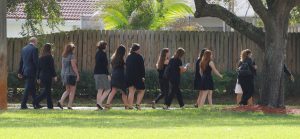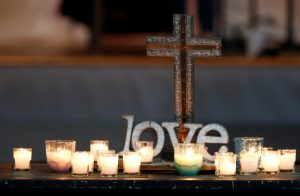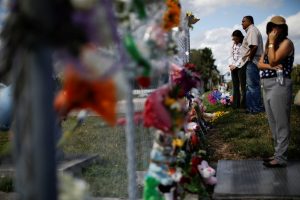
By Bozorgmehr Sharafedin
LONDON (Reuters) – In a swipe at his hardline rivals, President Hassan Rouhani said on Monday young Iranian protesters were unhappy about far more than just the economy and they would no longer defer to the views and lifestyle of an aging revolutionary elite.
The pragmatic cleric, who defeated anti-Western hardliners to win re-election last year, also called for the lifting of curbs on social media used by anti-government protesters in the most sustained challenge to conservative authorities since 2009.
“It would be a misrepresentation (of events) and also an insult to Iranian people to say they only had economic demands,” Rouhani was quoted as saying by Tasnim news agency.
“People had economic, political and social demands.”
Rouhani, 69, suggested there was a generational element to the unrest, which appears to have been spearheaded by under-25s.
“We cannot pick a lifestyle and tell two generations after us to live like that. It is impossible… The views of the young generation about life and the world is different than ours,” he said.
The Revolutionary Guards, Iran’s security backbone since the 1979 revolution that created the Islamic Republic, said on Sunday the security forces had put an end to a week of unrest fomented by what it called foreign enemies.
The protests, which began over economic hardships suffered by the young and working class, spread to more than 80 cities and towns and has resulted in 22 deaths and more than 1,000 arrests, according to Iranian officials.
Hamid Shahriari, the deputy head of the Judiciary said that all ringleaders of the protests had been identified and arrested, and they would be firmly punished and might face capital punishment.
Two Iranian lawmakers said on Monday that a 22-year-old detainee has died in prison.
The director of the Prisons Organization, Mostafa Mohebbi, confirmed the death on the judiciary’s official website and said “Sina Ghanbari has hanged himself in a toilet on Saturday”.
Many of the protesters questioned Iran’s foreign policy in the Middle East, where it has intervened in Syria and Iraq in a battle for influence with rival Saudi Arabia.
IRANIANS CAN CRITICIZE “EVERYONE”
The country’s financial support for Palestinians and the Lebanese Shi‘ite group Hezbollah also angered Iranians, who want their government to focus on domestic economic problems instead.
Rouhani won re-election last year by promising more jobs for Iran’s youth through more foreign investment, as well as more social justice, individual freedom and political tolerance – aims questioned by his main challenger in the contest.
Echoing some of his campaign rhetoric, Rouhani said on Monday people should be allowed to criticize all Iranian officials, with no exception.
Demonstrators initially vented their anger over high prices and alleged corruption, but the protests took on a rare political dimension, with a growing number of people calling on Supreme Leader Ayatollah Ali Khamenei, 78, to step down.
The Supreme Leader is commander-in-chief of the armed forces and appoints the heads of the judiciary. Key ministers are selected with his agreement and he has the ultimate say on Iran’s foreign policy. By comparison, the president has little power.
“No one is innocent and people are allowed to criticize everyone,” said Rouhani.
Rouhani also dismissed calls from hardline clerics who had asked the government to permanently block access social media and messaging apps.
As protests have ebbed, the government has lifted restrictions it imposed on Instagram, one of the social media tools used to mobilize protesters. But access to a more widely used messaging app, Telegram, was still blocked. The government has said the restrictions would be temporary.
“People’s access to social media should not permanently be restricted. We cannot be indifferent to people’s life and business,” Rouhani said.
Morteza Mousavian, head of information technology in the ministry of culture, was quoted as saying by Donya-e-Eqtesad Daily on Sunday that 9,000 business entities have been affected by the ban on Telegram.
Half of Iran’s 80 million population use Telegram.
State television showed live pictures of more pro-government rallies in several cities, including Sanandaj in western Iran, and Sari in north, as marchers carried posters of Ayatollah Khamenei and chanted slogans in his support.
Iranian Vice-President Masoumeh Ebtekar tweeted on Monday that Rouhani has insisted that all detained students should be released.
Mohammad Bathaei, the education minister said on Monday there were many school children among the detainees and he was asking for their release before exam season.
Amnesty International said last week that more than 1,000 Iranians had been arrested and detained in jails “notorious for torture and other ill-treatment over the past seven days”, with many being denied access to families and lawyers.
(Reporting by Bozorgmehr Sharafedin, Editing by William Maclean)












